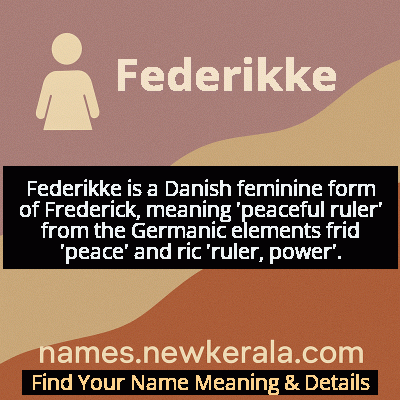Federikke Name Meaning & Details
Origin, Popularity, Numerology Analysis & Name Meaning of Federikke
Discover the origin, meaning, and cultural significance of the name FEDERIKKE. Delve into its historical roots and explore the lasting impact it has had on communities and traditions.
Name
Federikke
Gender
Female
Origin
Danish
Lucky Number
2
Meaning of the Name - Federikke
Federikke is a Danish feminine form of Frederick, meaning 'peaceful ruler' from the Germanic elements frid 'peace' and ric 'ruler, power'.
Federikke - Complete Numerology Analysis
Your Numerology Number
Based on Pythagorean Numerology System
Ruling Planet
Moon
Positive Nature
Diplomatic, friendly, artistic, empathetic.
Negative Traits
Over-sensitive, moody, indecisive, prone to self-pity.
Lucky Colours
Green, cream, white.
Lucky Days
Monday.
Lucky Stones
Pearl, moonstone.
Harmony Numbers
1, 3, 4.
Best Suited Professions
Diplomats, mediators, caregivers, artists.
What People Like About You
Cooperative spirit, friendliness, artistic talent.
Famous People Named Federikke
Federikke Lassen
Actress
Prominent in contemporary Danish television and film
Federikke Stenbæk
Royal Court Member
Served Queen Margrethe II of Denmark
Federikke Federspiel
Actress
Pioneer of Danish silent cinema
Federikke Sophie Knuth
Noblewoman
Influential 18th century Danish countess
Name Variations & International Equivalents
Click on blue names to explore their detailed meanings. Gray names with will be available soon.
Cultural & Historical Significance
Extended Personality Analysis
The name Federikke carries strong personality associations rooted in its etymological meaning of 'peaceful ruler.' Individuals with this name are typically perceived as possessing a natural authority that is tempered with empathy and diplomatic skill. They often exhibit what psychologists might call 'transformational leadership' qualities - the ability to inspire and motivate others through vision and personal connection rather than command. Federikkes are frequently described as having exceptional emotional intelligence, able to read social dynamics accurately and navigate complex interpersonal situations with grace. Their 'peaceful' aspect manifests as a calming presence in stressful situations, while their 'ruler' qualities emerge in their capacity to take charge when necessary. This combination often makes them excellent mediators, educators, and community leaders. They tend to be deeply principled yet pragmatic, valuing both tradition and progress, and often serve as bridges between different generations or cultural perspectives. Their strength lies in their ability to maintain personal integrity while adapting to changing circumstances.
Modern Usage & Popularity
In contemporary naming practices, Federikke represents a choice that balances tradition with distinctiveness. While not currently trending among the most popular Danish names, it maintains a steady presence particularly among families with strong connections to Danish heritage or aristocratic backgrounds. According to Danish name statistics, Federikke appears outside the top 100 names but sees consistent usage of approximately 15-25 births annually in Denmark. The name has experienced a minor revival as part of the broader trend toward vintage and heritage names, appealing to parents seeking names with historical depth and cultural specificity. Interestingly, the name sees slightly higher usage in urban areas like Copenhagen, suggesting an association with educated, cosmopolitan families. The diminutive 'Rikke' provides a more casual, contemporary option that has gained some popularity in its own right. Internationally, Federikke remains rare outside Scandinavian communities, though it occasionally appears among families of Danish diaspora seeking to maintain cultural connections.
Symbolic & Spiritual Meanings
Symbolically, Federikke embodies the powerful concept of 'peace through strength' - the idea that true peace is not passive but requires active cultivation and protection. The name metaphorically represents the Scandinavian social model itself: strong, well-organized societies that prioritize harmony, equality, and collective well-being. In nature symbolism, Federikke might be associated with the ancient oak tree - strong and deeply rooted yet providing shelter and sustenance. The name also carries lunar symbolism, suggesting the gentle but persistent influence that shapes tides and rhythms without force. In color symbolism, it resonates with deep blues and silvers - colors of wisdom, calm, and refined strength. The dual elements of 'peace' and 'rule' create a symbolic tension that represents the balance between freedom and responsibility, individuality and community. This makes the name particularly meaningful in our contemporary global context, where leadership increasingly requires the ability to navigate complexity with both conviction and compassion.

